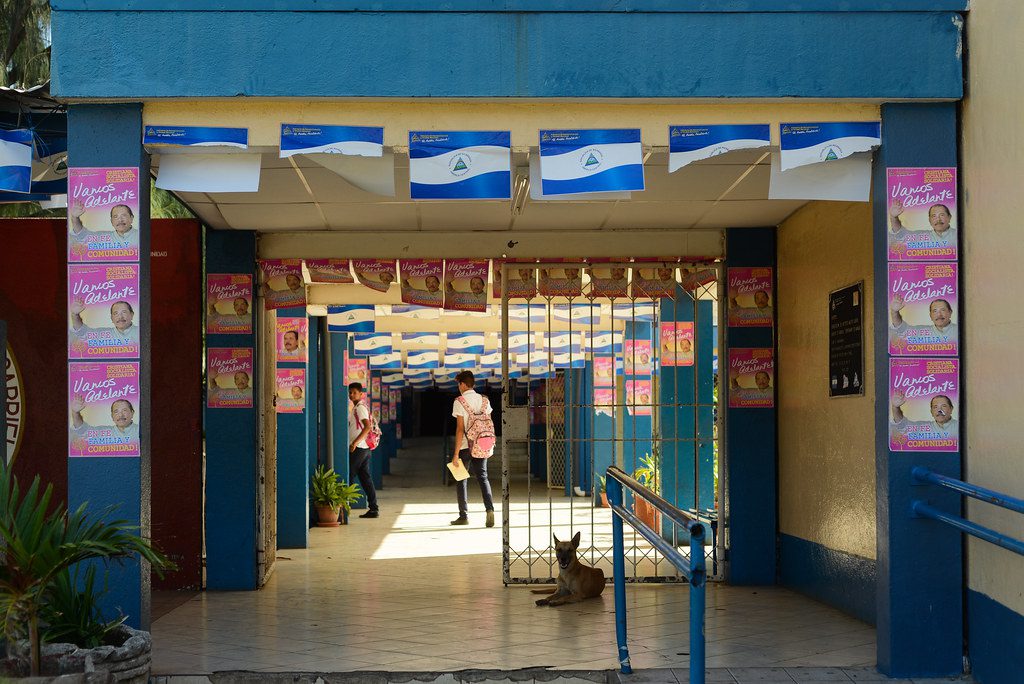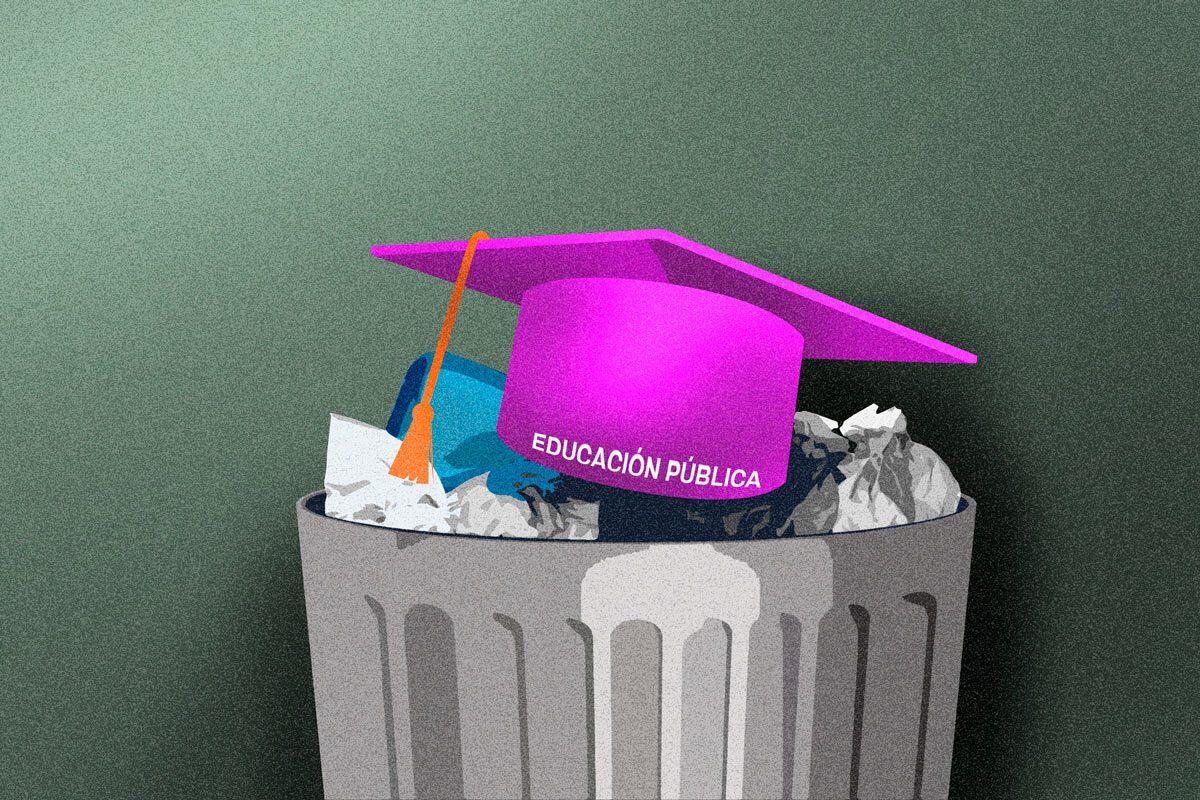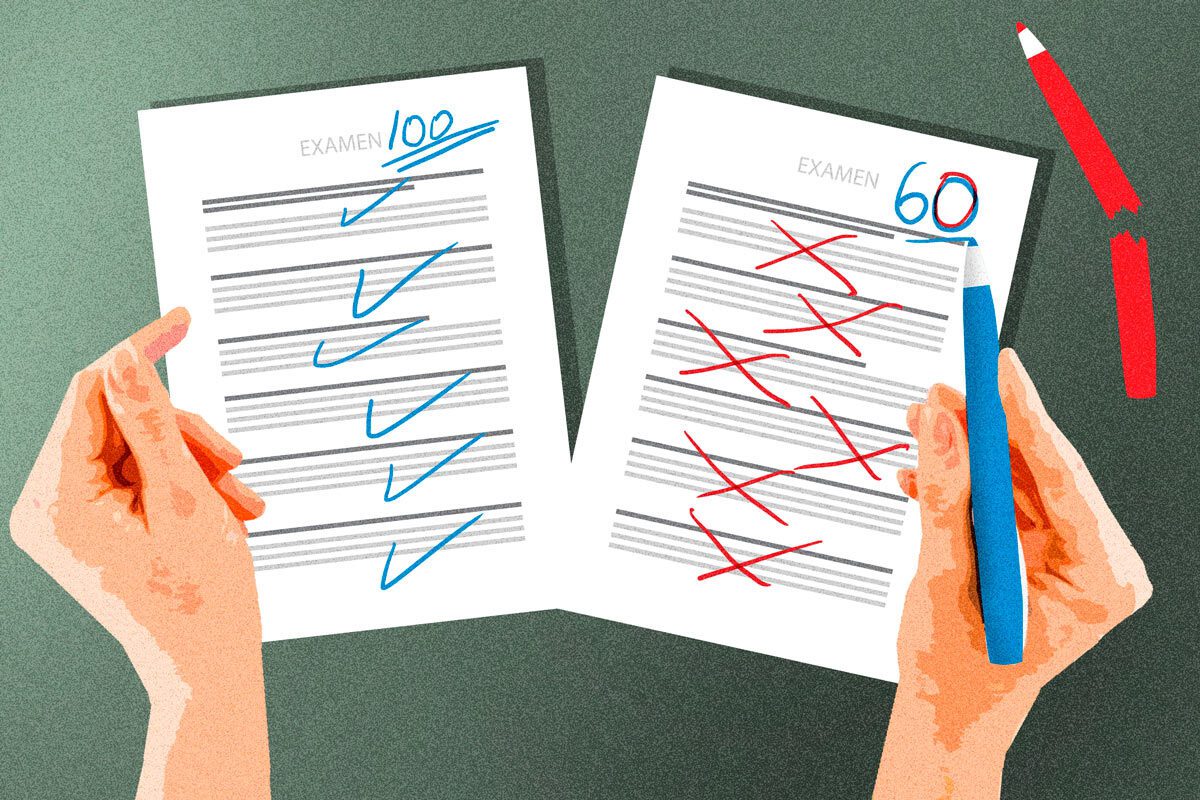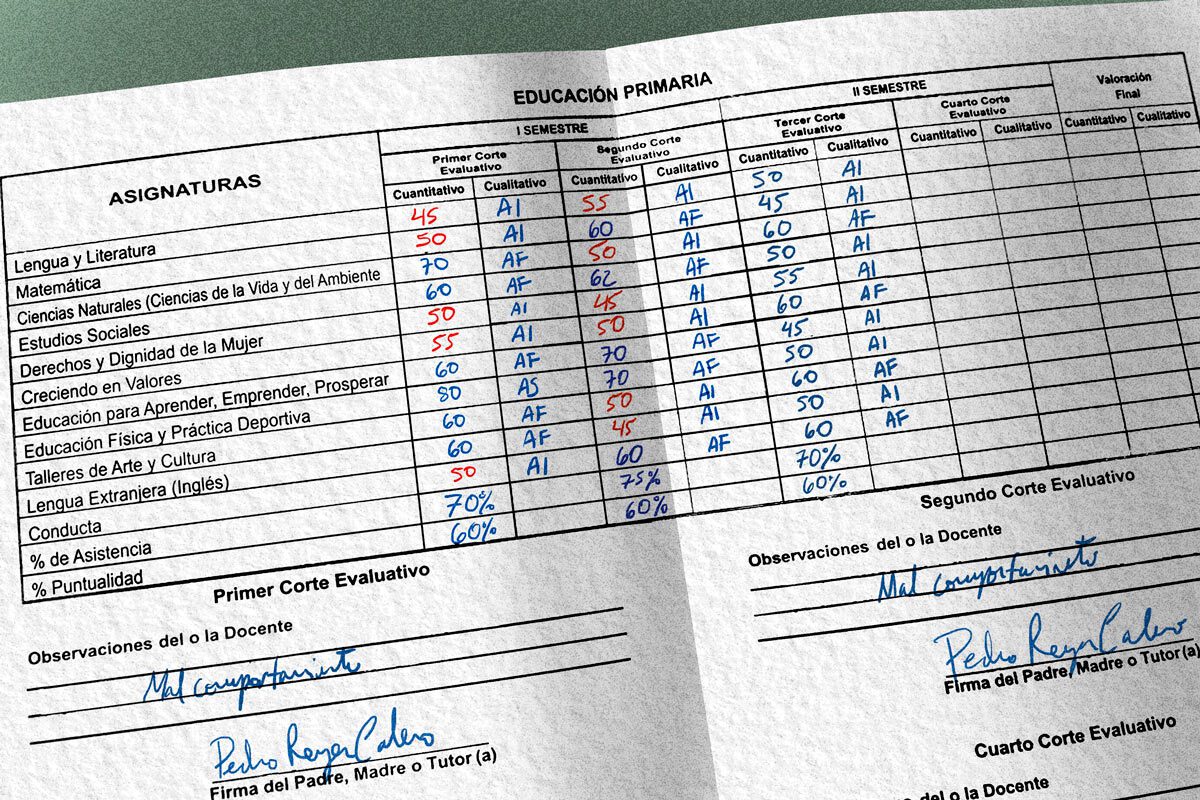In teacher Mauricio‘s pencil case there is only room for colored markers and blue pens. Any correction in a notebook, test or report has to be done in blue ink. “They say that if we use red, we are causing trauma to the students,” explained this teacher who works in a public school in Masaya.
The use of red ink to mark deficient or mediocre academic grades was prohibited in one of the last meetings held by delegates of the Ministry of Education (Mined) and Government officials with teachers, prior to the beginning of the 2023 school year. “At that time we did not take it very seriously, but in the middle of the year it became a requirement”, said the educator.
In that meeting, the order of Mined delegates was not “so strict”. Although authorities were emphatic that all students had to pass with the new methodological plan they were implementing, the comment to use only blue pens to review homework was not a requirement, but a “recommendation”.
For the preparation of this article, DIVERGENTES consulted a source at the Ministry of Education who disagrees with the educational policy of the Sandinista regime, because it promotes mediocre students.
We also talked to primary and high school teachers, as well as directors of public schools. They all agreed that the educational system is not only declining but is also a screen to “sell something that does not exist”.
“The only thing I felt was an obligation in that meeting was the evaluation system that eliminates failed students and passes them all. But I thought of the idea of using a blue pen and not a red one as something irrelevant,” said Graciela, a language and literature teacher at a high school in Managua.
Mined: do not mark grade reports with “red”

However, after the delivery of report cards for the second evaluation period in July 2023, alarms were raised at the Ministry of Education (Mined). According to the ministry source who spoke to DIVERGENTES under anonymity, the coordinators of the new evaluation system did not like the fact that many teachers continued to fail students and mark their report cards with red numbers.
“Those failed students caused a delay at the time of uploading grades in Mined’s system. The data entry staff had to make changes so that everyone would pass in the system. That’s why they were so annoyed and because teachers didn’t obey the order”, explained the Ministry source.
A typist who spoke to DIVERGENTES explained that teachers have a notebook to record grades, which then goes to the school book, which is in the principal’s office of each school. To make grades official, they are taken to the central Ministry of Education by the school principal. There, the data entry staff is in charge of uploading them to the system.
“With the new evaluation system, the data entry staff only enter the grades into the system and it, since it assumes that there are no failed students, by default gives a passing grade. But since there were teachers who failed students, then everything was wrong. We had to modify it so that everything would match and come out as required by the ministry,” explained the data entry specialist.
The teachers’ “disobedience” resulted in the fact that in the meeting of the second evaluation period, held in mid-July, the Ministry delegates ordered the teachers not to fail any student and to be serious about using only blue ink to correct work and put grades in report cards.
Regime alleges psychological damage to students who failed
“In the meeting they told us that if we continued using red pens we were going to cause great psychological damage to the students. That failing was not in line with the new educational regulations worldwide. We were all scared in that classroom,” said Santiago, a sixth grade teacher who works in a public school in District V of Managua.
However, far from banning red ink because it “affects the students”, the order to use blue, explained the Ministry source, seeks only that the evaluation plan is fully complied with and that the statistics of failed students, which is 7% nationwide, will decrease to 1% by the end of the year.
“I have received complaints from teachers who do not agree with this government policy, but we cannot change the rules that come from the authorities. The goal they have is far from quality education,” said the Mined source.
The new evaluation system and its compliance

In April of this year, DIVERGENTES published an investigation which revealed for the first time the new evaluation system for learning, ordered by the Sandinista regime through the Ministry of Education, with the aim that no student should fail, even if they “fail half of the year” or submit deficient assignments.
In the new plan, the Ministry of Education opted to change the scoring system. Now, instead of teachers grading a test and giving a grade based on the student’s knowledge, the educational authorities established evaluative categories with a minimum and maximum number of points.
According to the manual, the evaluative categories are Advanced Learning (AA), which ranges from 90 to 100 points; Satisfactory Learning (AS), which is scored from 76 to 89; Fundamental Learning (AF), which has a maximum score of 75 and a minimum of 60 points; and Initial Learning (AI), with a maximum score of 59 and a minimum of 45 points.
| Qualitative | Quantitative |
| AL | 100 – 90 |
| SL | 89 – 76 |
| FL | 75 – 60 |
| IL | 59 – 45 |
“To obtain the grade of an evaluation period, the teacher has to develop several activities and evaluate according to the categories. And here there are other criteria that the Ministry of Education includes in the new system and are taken into account according to the combinations,” explained another source linked to the Ministry of Education.
If in the evaluation of that first cut, the student obtains AL, AL and SL, the final grade will be the predominant evaluative category, i.e. AL. “And in numbers the maximum grade will be reflected, which is 100, because the orientation is always to put the highest number”, said a Biology teacher to DIVERGENTES.
Fake grades for students

The new plan states that if a predominant rating is not obtained, the intermediate of the scale or the closest to the highest, as the case may be, will be assigned. For example, if a student earns an IL, SL and FL, the grade will be FL.
“Here’s the catch. If we take as a reference the minimum score imposed by Mined and instead of the categories we put numbers, we will have a 45, a 90 and a 76. Then the final grade would be 76. That grade could vary if it were the teacher who gives the grade based on the student’s knowledge, but that is no longer decided by them,” said the same source, who explained that by taking away the teacher’s power to grade according to the previous knowledge of each student, what is obtained are fake grades.
The application of the new methodology to approve students, added to the “scolding” that the Mined delegates gave to teachers to stop using red pens to correct and fail students, had a negative effect from the academic point of view in the third evaluation period in 2023.
In mid-September, during the delivery of reports of the third evaluation period, student grades were positive, because teachers passed their students, even if they did not comply with the delivery of homework or results in tests or group work.
“The typists uploaded grades to the system with little delay because most of the students passed. The result was optimal according to the goals set by the Government with the educational plan”, the source of Mined told DIVERGENTES.
However, despite the “good results” in its strategy, the regime ordered another guideline to ensure full compliance with the new evaluation plan: registering the continuous enrollment of students.
The order was intended to ensure the student’s spot the following year and to guarantee promotion to the next grade even if the student doesn’t have the merit to pass. “In short they are telling us that the student, even if they are bad and does not know how to read or add and subtract, we promote them to the next grade. In my case, I talked to my principal to prevent students who don’t know anything from passing so easily, but he told me that it was an order and he could not contradict it,” said Sandra, a primary school teacher in Tipitapa.
Teasing from students and fear of sanctions

Graciela, the Language and Literature teacher consulted for this article, remembers with nostalgia those years when teachers were respected by their students. “The kids earned their grades with a lot of effort and knew that you taught them. Now that’s changed,” she said in a discouraging tone.
The teacher expressed that after all the transformations the educational model has gone through in Nicaragua which aim to pass students no matter what, the students themselves, apart from not caring about attending classes or completing assignments, also disrespect the teachers.
“Once I reprimanded a student because he had not turned in any homework. His response was ‘I don’t care, you’re going to pass me anyway’. What he said upset me, but I didn’t say anything because it’s a fight I was not going to win. Why? Because in the end it’s true, I can’t fail him because the first thing they’re going to do is report me,” said Graciela.
The teachers who were interviewed for this report agree with the Language and Literature teacher regarding the order to pass everyone. Some of them even shared what happens when a teacher fails a student in a class.
“If we enter failed students, we are immediately reprimanded. In the first period, the principal asked me why I had failed a student in three subjects. I said that he was not completing assignments. Immediately, he told me that in the next grading period, if the same thing happened, I should give him extra work to pass,” explained Jorge, a sixth grade teacher in Diriamba.
“Aids” to avoid failing students
According to Jorge, the directors request these “aids” for the students, because if news of a failed student arrive at the central Ministry, the delegates immediately visit the teacher to find out why the education plan promoted by the Ministry is failing.
“I have already seen cases in which they arrive, sit the teacher down, ask him if the staff has not presented them with the guidelines or if the directors are not doing their job. They also ask them if there is no political and institutional awareness and question them about what they are doing to follow the strategy,” said Jorge, who added that many teachers feel that these visits are some kind of harassment.
The Ministry source said that teachers who do not comply with the Ministry’s orders are exposed to sanctions or being fired. And although the salary of a teacher is low, most of them comply with the demands, because they do not have another job opportunity.
“When this problem arises, they demand that we look for a method so that the students do not fail. I don’t agree. No teacher agrees. But if we don’t keep on making things up, we will be fired. We have no choice but to play along with their show,” Jorge concluded.





